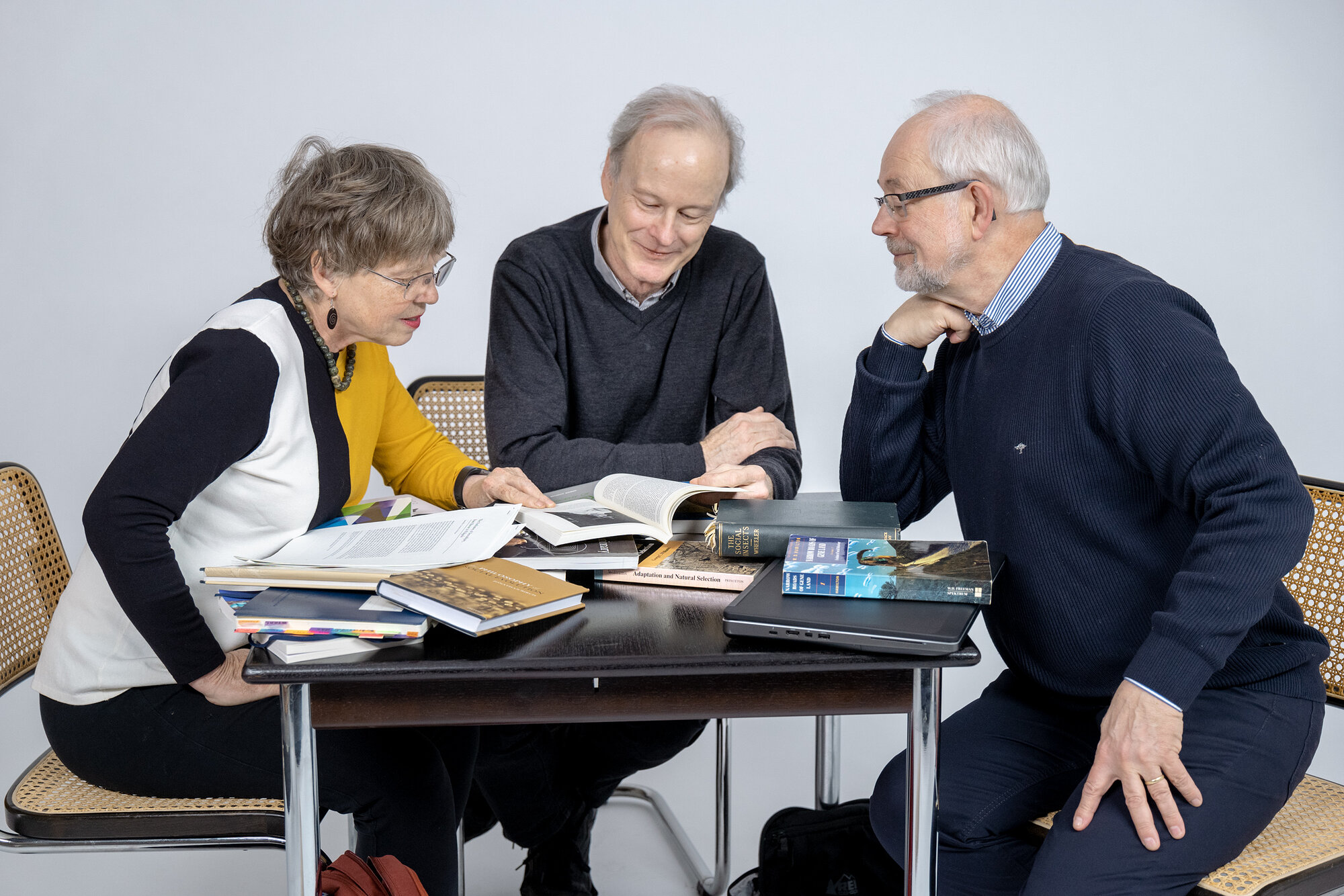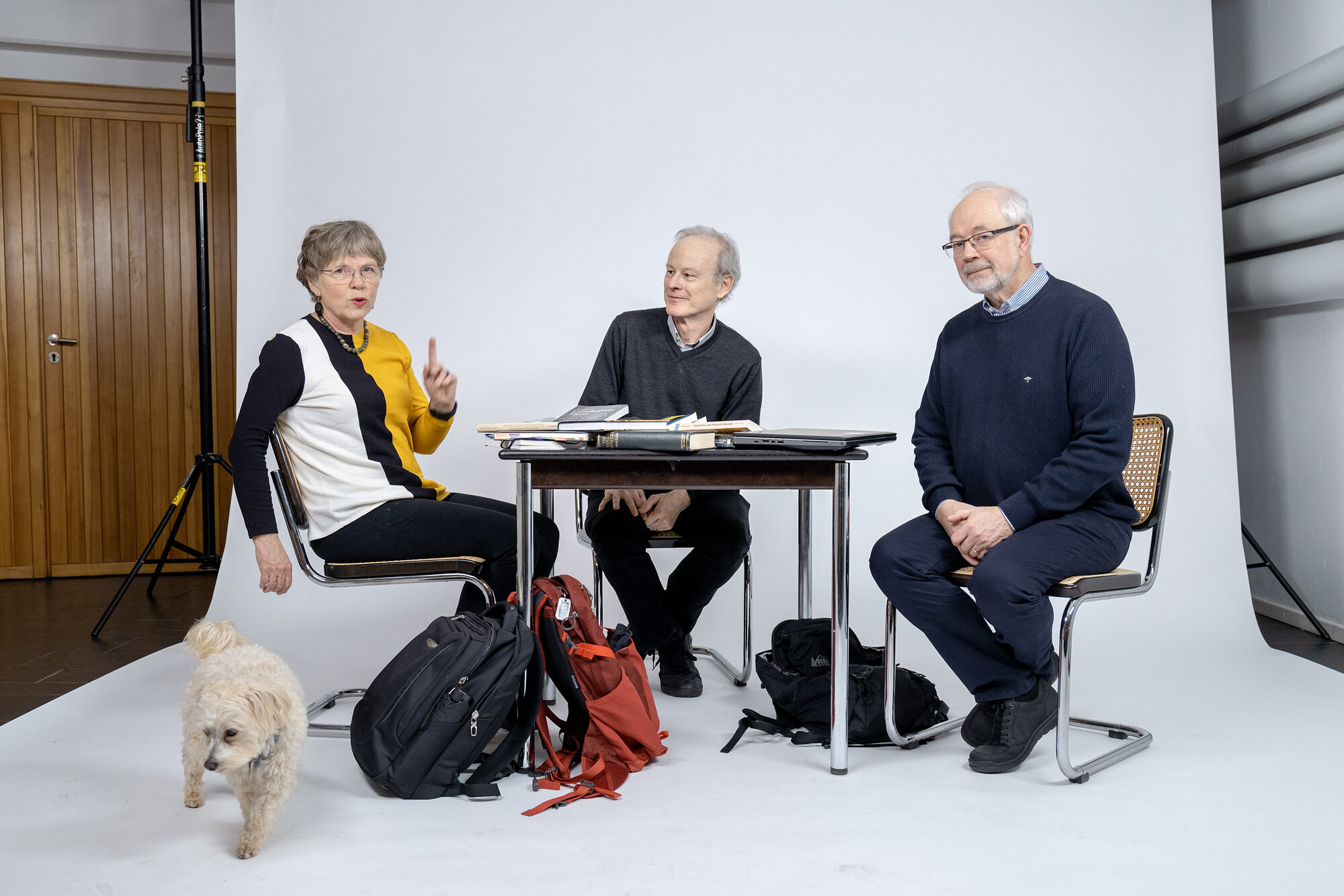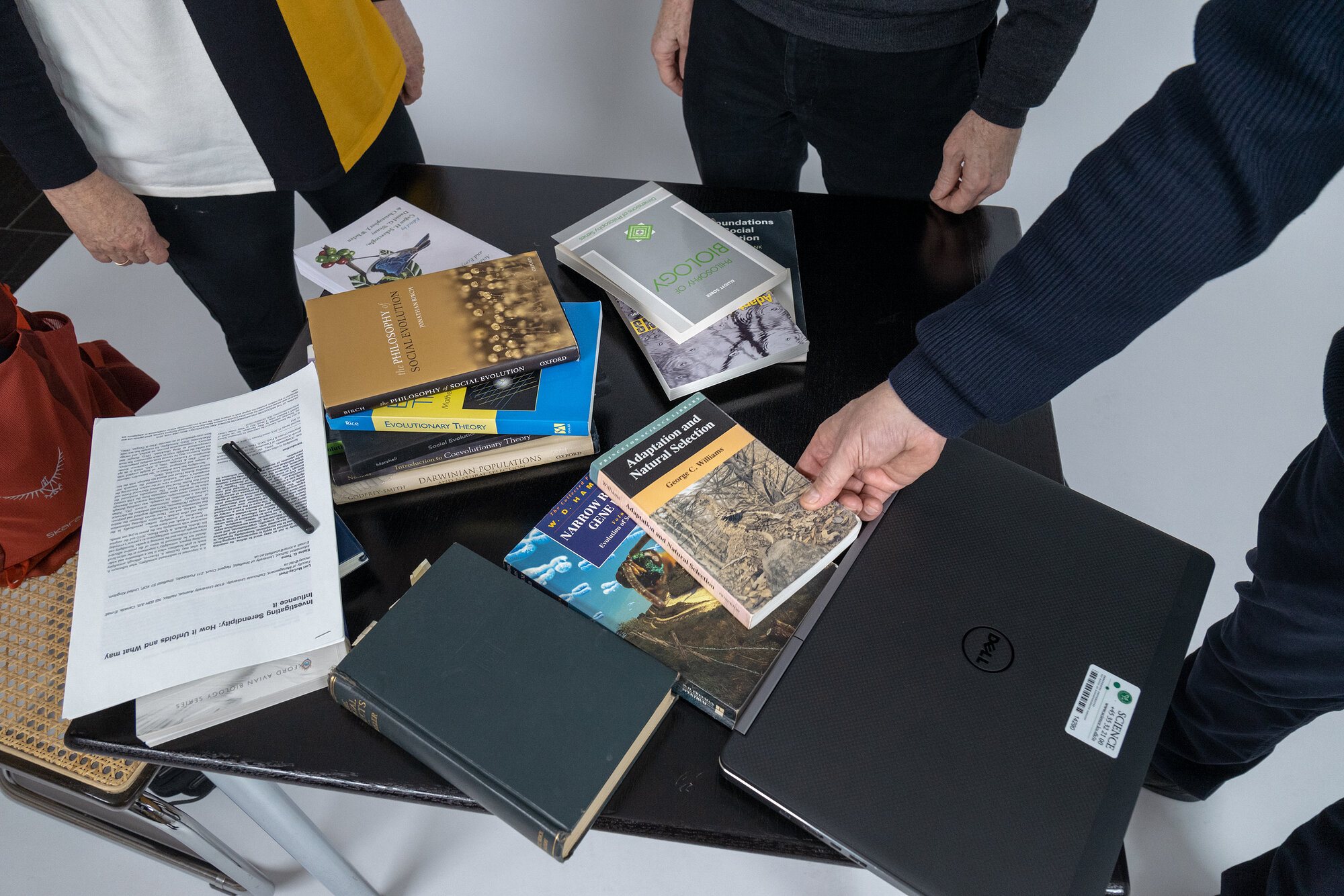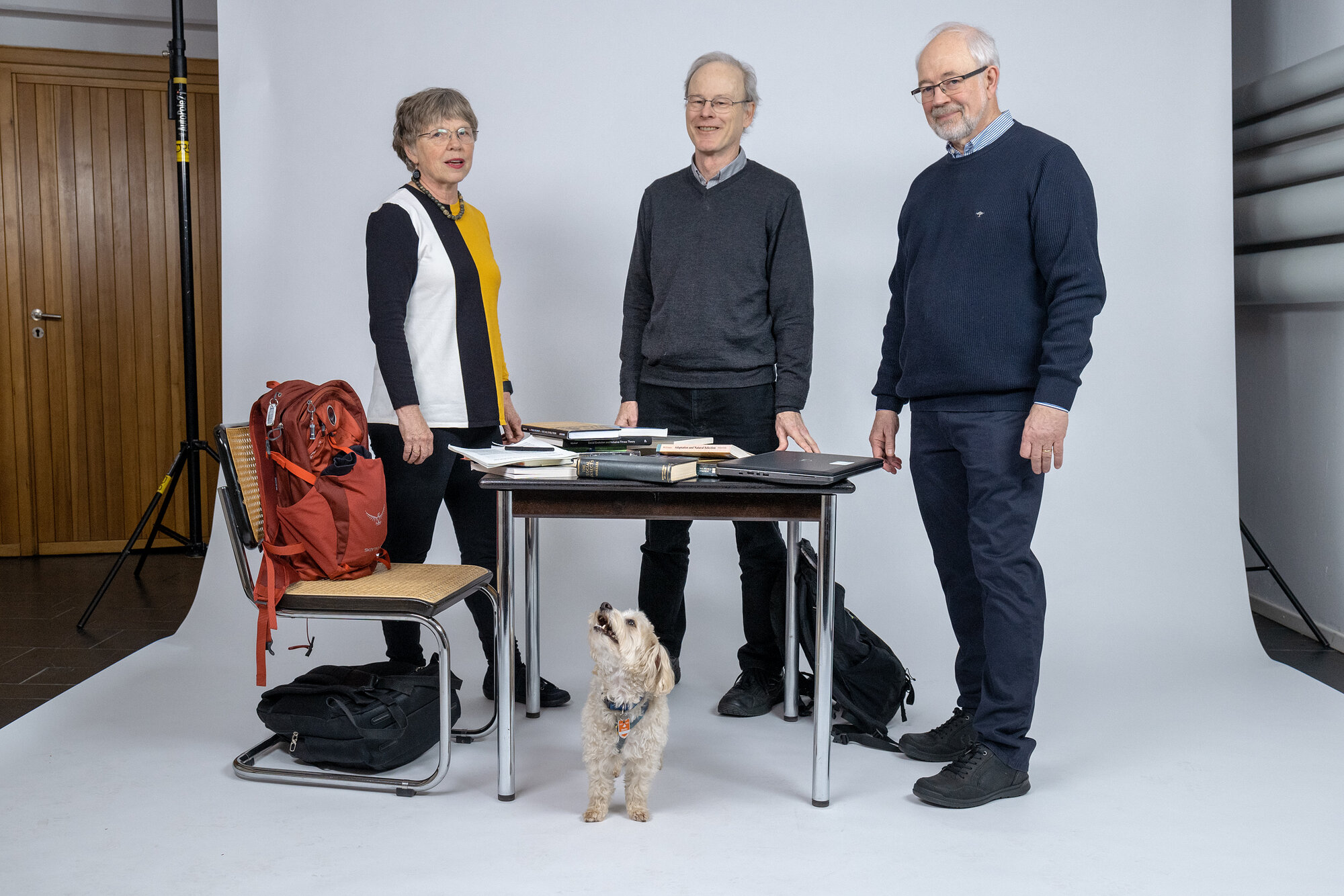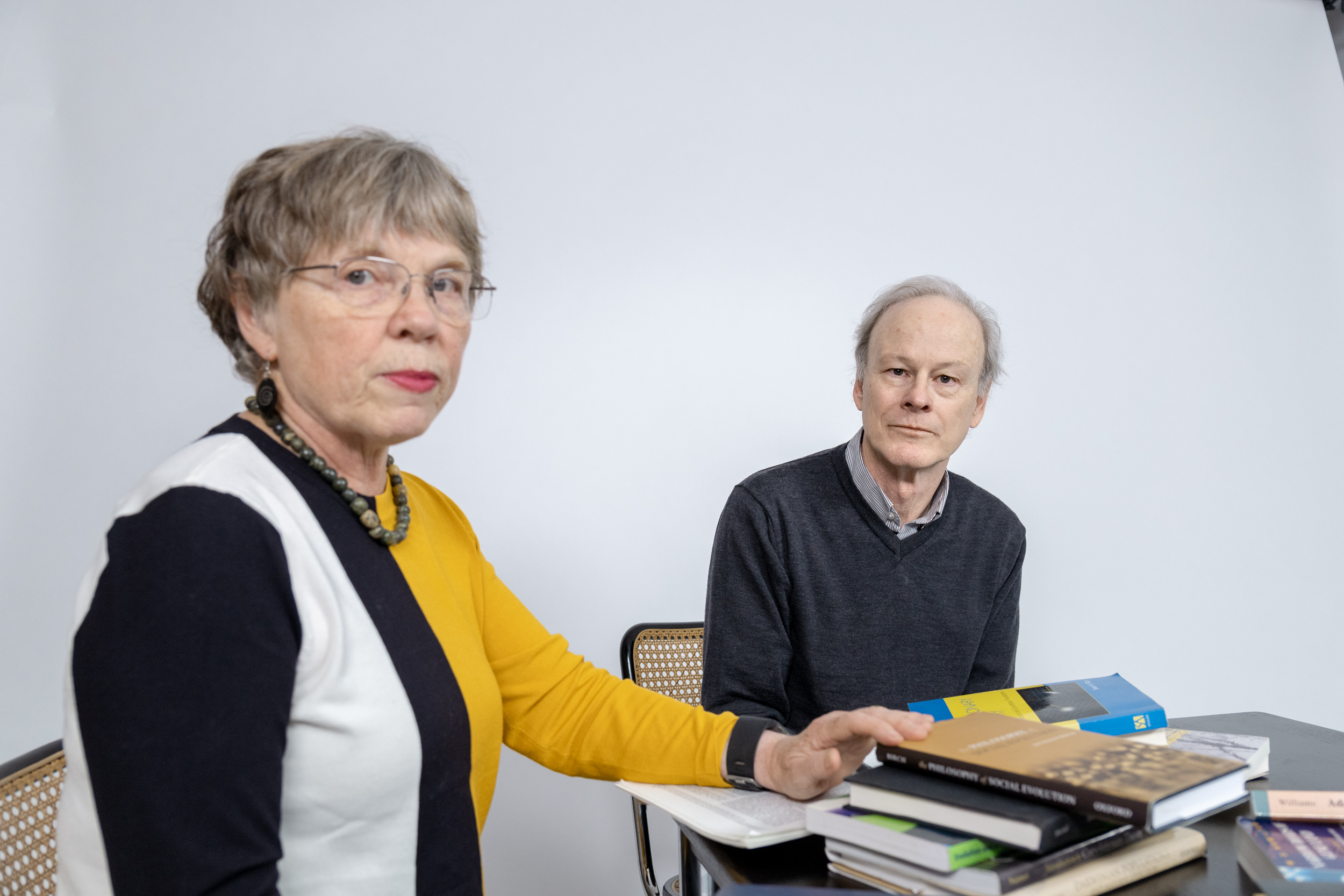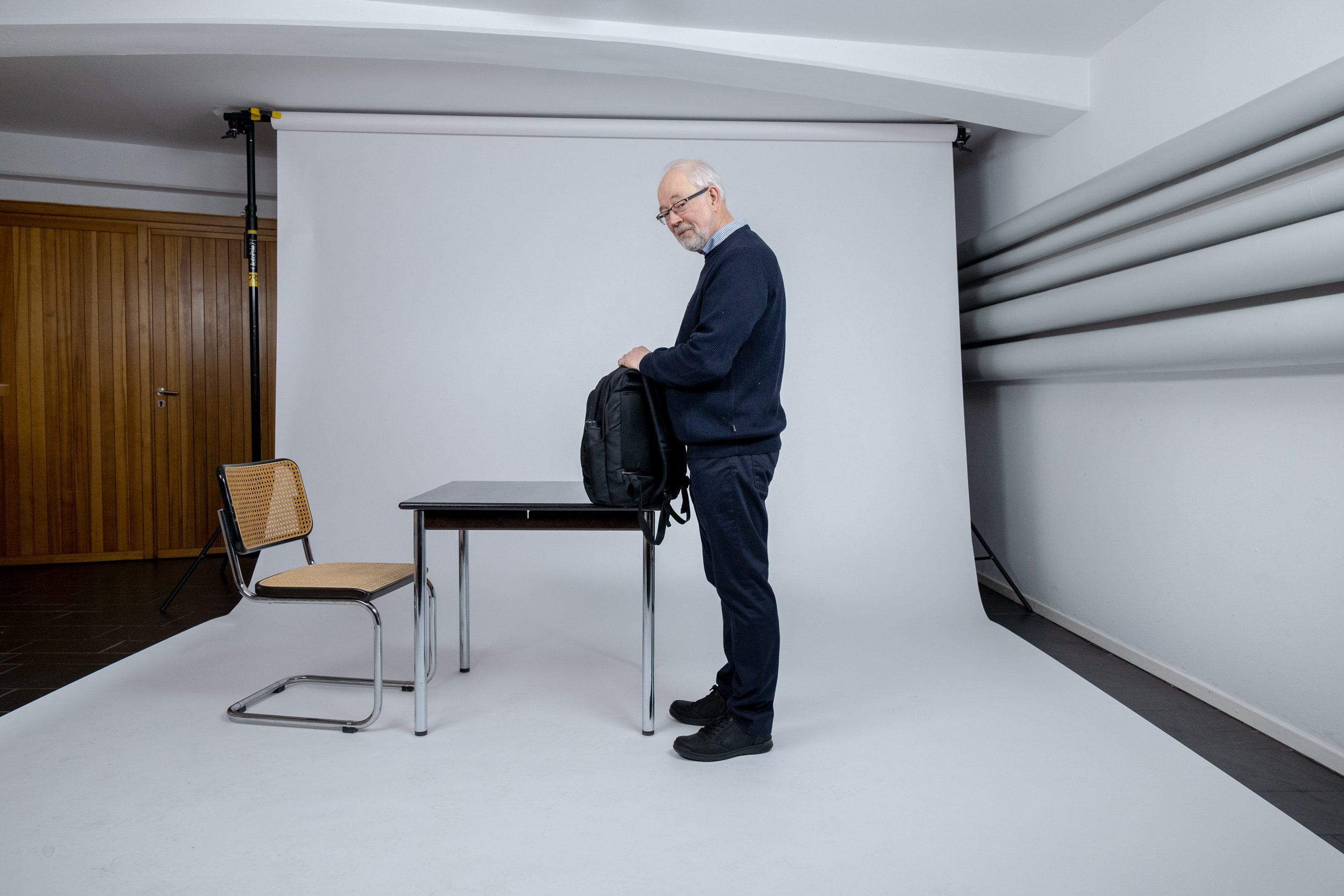Issue 14 / January 2019
Tamed Conflict
a portrait of Jacobus J. (Koos) Boomsma, Ashleigh Griffin, Nancy A. Moran, Howard Ochman, David C. Queller, Joan E. Strassmann by Manuela Lenzen
How evolutionary biologists attempt to make sense of the existence of organisms from first principles
When the wind arises the Portuguese man o’ war sets its opalescent sail and drifts. Bathing beaches are quickly cleared when a flotilla of these foot-long creatures approach, for they possess metres-long tentacles whose stinging cells shoot a poison that kills small fish and can raise painful wheals on human skin. The Portuguese man o’ war is a jellyfish – or more precisely: a siphonophore. It has the outward appearance of a full-fledged animal in its own right, but the man o’ war consists of hundreds and sometimes thousands of polyps all arising from a single fertilized egg. Each polyp resembles a single organism like a Hydra, but in the man o’ war they specialize in a variety of tasks. There are feeding polyps, tactile polyps and sexual polyps, while others are responsible for the gas-filled sail. They cooperate and depend on each other to a degree that on their own and separated from one another, these polyps are incapable of surviving. Is such a creature a polity, a hive, a colony? Is it a single organism or multiple ones?
“It’s appalling, actually,” says Joan E. Strassmann, evolutionary biologist at Washington University in St. Louis and Fellow of the Focus Group The Major Evolutionary Transitions in Organismality. “There’s no reasonable definition as to what an organism is – at the same time it is the most important unit of life. Of course much has been written on the subject, for instance that all parts of an organism must be related, that they are surrounded by a skin, that organisms emerge from a cell. But none of these definitions seem to work universally because most researchers have only examined a small snippet of the world of living beings.” Along with such standard organisms as mice, birds and whales, there is so much more. One example is Pando, also known as the “Trembling Giant,” a clonal colony of quaking aspens in the U.S. state of Utah, which in its entirety is the oldest and heaviest living thing on earth. Pando may have the appearance of a run-of-the-mill forest, but the many genetically identical trees are linked through a massive underground root system, so they could be viewed as component parts of a single living organism. Then there is the social amoeba Dictyostelium, more challenging because a multicellular stage arises not from a single clone but by aggregation of occasionally genetically distinct individuals. If sustenance is scarce then individual amoebas conglomerate to create a form of life that can propel itself and develop into a fruiting body with a sterile stalk with live wind-dispersed spores on top that hatch into new amoebas when conditions again become favorable. “And then there are colonies of bees and ants”, says Strassmann. ”Plus there is the entire microbial world with all kinds of curiosities.”
These uncommon creatures not only draw our attention to the fact that a good definition for “organism” is lacking. They also show that nature has repeatedly been solving a problem which has long troubled evolutionary scientists – namely the emergence of stable cooperation between various creatures for benefit of a greater whole. That which is apparent in the siphonophores and the slime molds is strictly speaking the case for all organisms, from a single-celled alga to complex vertebrates. They consist of many components which have forfeited their natural competitiveness with respect to nutrients, reproduction and pecking order. Hence, in large part, evolution means social evolution. But how can this be the case when natural selection only rewards one’s own successful reproduction in competition with others? Or in the words of Koos Boomsma, evolutionary biologist at the University of Copenhagen and convener of the Focus Group: “Despite the pervasive internal conflicts that confront us in many complex organisms, how can we explain their emergence? Was there no conflict at all when they came about or did conflict have to become reduced?”
The answer to this question is related to explaining the concept of those major evolutionary transitions which the group is named after. According to this concept, in the history of life there were a few very great steps – the first one being the evolution to simple cells, from there to the eukaryote single-cell organism with a nucleus and mitochondria, then multiple times to multicellular organisms, and further on to creatures such as siphonophores and obligate colony life in ants, bees, wasps, and termites. And these entities always succeeded in establishing a new form of cooperation. “More precisely put, we defined just what an organism is through the concept of the great transitions”, explains Strassmann. In line with this, an organism is something that has the inner conflicts between its component parts well under control – an entity within which cooperation rather than conflict reigns.
As it is within organisms, occasional conflict can happen – tumors are one example. “I know the incidence of cancer is much too high,” says Strassmann, “but from an evolutionary standpoint it’s surprising that it doesn’t occur more often. Cancer is actually the normal state of things out there.” Why? Because every mutation that enables a cell to divide with greater speed than its neighbor will lead to a tumor. This is just the sort of process that gives advantage when the dividing cells are separate unicellular organisms so it is remarkable that it is largely suppressed within multicellular organisms. Tissues which live in a Petri dish will form tumors at a much faster rate than those in an organism. One explanation for the comparatively stable harmony in body tissues is that animal bodies are mostly clones, emerging from a single zygote after sexual reproduction. “Before two cells sexually coalesce they are normally genetically unrelated and have no joint interests,” says Boomsma. “The egg cell may profit more from fusing with a certain sperm cell than another. But after having fused the gametes will either continue to develop or both perish.” He notes that this form of “lifetime commitment has remained underappreciated as a conflict elimination principle.” All cells of the future organism are then clones of this original cell and will – according to William D. Hamilton’s theory of inclusive fitness – share the exact same interests. From the gene’s perspective it is then immaterial whether a cell divides and swims away or remains attached to help create a multicellular body. Decisive was which level of organismal complexity realized the highest number of gene copies in future generations. And if cooperation was the best route to this goal, then it came to be. “As it turns out“, says Boomsma, “this genetic bottleneck was a necessary condition for all lineages in which permanent multicellularity evolved.” Disciplining cells into sterile somatic functions required a lot of change in developmental programs, which produced many checks and balances to ensure cells normally commit suicide before they become cancerous when their loyalty erodes through somatic mutations. Strassmann states: “Our bodies are actually ceaselessly working to impede cancer with a huge toolkit that constantly proofreads DNA replication.”
Thus at the start of a major transition there appear to be shared interests among founding units, either because they are genetically identical, or because their fates have merged, as for example in eukaryotic cells where genetically distinct entities became one. After an organism has arisen mechanisms evolve that prevent a rekindling of conflicts that would make the organism disintegrate. Once all this has happened, there is apparently no way back. The polyps remain attached in the Portuguese man o’ war instead of making their way, one by one, back into the ocean. “Actually, we are trying to understand Hamilton’s theory of inclusive fitness - according to which evolutionary success depends on spreading the maximum number of one’s genes to future generations – as the special instance of a much more comprehensive theory”, explains David Queller, also from the Washington University in St. Louis, “a theory where it doesn’t matter who is who so long as the cooperation is worthwhile.” This theory would include what Queller calls fraternal major transitions in which clonal organisms or those with high genetic relatedness like the Portuguese man o’ war, social amoebae, or social insects have undergone a major transition, but also egalitarian transitions which arise when unrelated and different parts throw their fates together, as in the case of the eukaryote cell which is made up of two formerly different bacterial cells originating from very different kinds of bacteria. “That might be called the most successful major transition of all”, he says.
To be general, this theory would also have to pertain to life forms that look less like a single organism than the Portuguese man o’ war, for instance the colonies of honeybees and ants. All available data so far indicate that the independent origins of colonies with permanent differentiated worker castes also had lifetime commitment as a necessary condition, but this time between two parents – the colony-founding queen and her strictly monogamous mate. As in the zygote where neither sperm nor egg can opt out of the commitment once a zygote has formed, so will a committed pair of parents die with the only sexual partner they will ever have in life. “This strict form of monogamy is never found in the vertebrate kingdom, explaining why no vertebrate has evolved true workers castes like ants that will never mate,” says Boomsma. As is the case when permanent multicellularity evolved, it is as worthwhile to raise full siblings as it is to produce one’s own offspring. Thus, complex colonial superorganisms appear to have had the same type of necessary founding conditions that complex multicellular organisms have had.
Together with Joan Strassmann, David Queller has developed a system of coordinates so as to bring order to the various types of organisms. The horizontal axis of this coordinate system runs from “more conflict” to “less conflict,” the vertical axis from “less cooperation” to “more cooperation.” Only those creatures entailing more cooperation and less conflict can merit the designation of organism. “For example we place a whale in the upper-right corner,” says Strassmann. “The cells of the whale demonstrate a great deal of cooperation and very little conflict.” A colony of bees also displays a high level of cooperation: “ But there exist certain conflicts between the individual bees, so we would regard the colony as an organism while still not being able to place it far to the right on the cooperation axis.” In contrast, there is too much competition in flocks of birds for the flock to be organismal. Strawberries and their clonal offshoots do not qualify as an organism for a different reason: despite having little conflict, they lack sufficient cooperation. In this conception the genetic kinship or a skin to encase all components is unnecessary in defining an organism. Even organisms consisting of apparently separate individuals, for instance social amoebae, or aspen trees, are possibilities.
A system of coordinates for all creatures great and small? Boomsma nods his head. But instead of the continuum, as suggested by the coordinate system, he emphasizes the very different organizational origins of complexity. For instance, a colony of ants has undergone an irreversible transition to caste-based super-organismality where all workers are as similarly committed as the clonal cells of a body – they are both part of the greater whole that stopped competing for food throughout their lives. “The only difference is that in this case every ‘cell’ has six legs and a brain.”
A super-organism? This incites a mini-dispute. “I think we should leave this term aside,” says Queller. “In a certain sense we are all super-organisms, every cell is a super-organism, so we soon arrive at super-super-organisms.” Boomsma counters: “I find the term ‘super-organism’ to be very practical, because it expresses the fact that a novel complexity level has been realized, a biological insight that has been around for a century. We are all trying to find economical and apposite terms to describe and understand what takes place, and every term has its strengths and weaknesses. From a historical point of view, the modern theories have focused on explaining cooperation in explicit quantitative terms, and the Hamiltonian inclusive fitness way of phrasing the theory is becoming more and more general. But you cannot understand cooperation unless you have understood how disintegrating conflicts are kept at bay. “Here at Wiko potential social conflicts are always on our minds.” He laughs. Evidently, the three Fellows have their conflicts under control; they have undermined neither their cooperative relationship nor the present good mood. But the three of them would never manage to function as an organism. Queller elaborates: “When there is a coincidence of high levels of cooperation with a certain number of conflicts, then we plot it to the left of the vertical axis and call it ‘society’.” Boomsma agrees, but adds that “societies apparently never realized major transitions to superorganismality.”
Modern social evolution research has only become possible since methods became available to genetically measure the kinship of cooperating cells or bodies – this is established routine in the research groups of all three and Queller has been particularly instrumental in developing the statistical tools to estimate relatedness from genetic marker data. “During our own student years these molecular methods hardly existed,” says Boomsma, “but over time we have continued to adopt them, so that working with sequenced genomes, for example, has now become a normal part of our lab lives. And we have great postdocs who know the nitty-gritty of all that better than we do and they keep us on a steep learning trajectory.”
And the next major transition? “Well,” he continues, “it is not sure that there will be one, just like the previous ones were unpredictable. All we try to do is specify the principles that were universally obeyed in the past.” A coherent theory of social evolution based on inclusive fitness and the major complexity transitions remains the focal point of the Fellows’ own personal projects: Joan Strassmann’s study of the natural history of organisms, David Queller’s attempt to explain a cohesive perspective on organisms through precise mathematical formulations, and Koos Boomsma’s urge to see just how far the principle of “lifetime commitments” can be expanded. If the project succeeds then first principle theory will be able to explain cooperation and conflict in such diverse forms of life as ant colonies and eukaryote cells. “Ask us again this coming summer,” says Strassmann. “By then we will have learned much from the interdisciplinary discussions with the other Fellows. We hope that this will also lead to a greater transformation of ourselves.”
Ashleigh Griffin, evolutionary biologist at the University of Oxford, Nancy Moran and Howard Ochman, biologists at the University of Texas at Austin, are further members of this Focus Group. They will join the other three from April to the end of the academic year.
More on: Jacobus J. (Koos) Boomsma Ashleigh Griffin Nancy A. Moran Howard Ochman David C. Queller Joan E. Strassmann
More on: The Major Evolutionary Transitions in Organismality
Images: © Maurice Weiss
